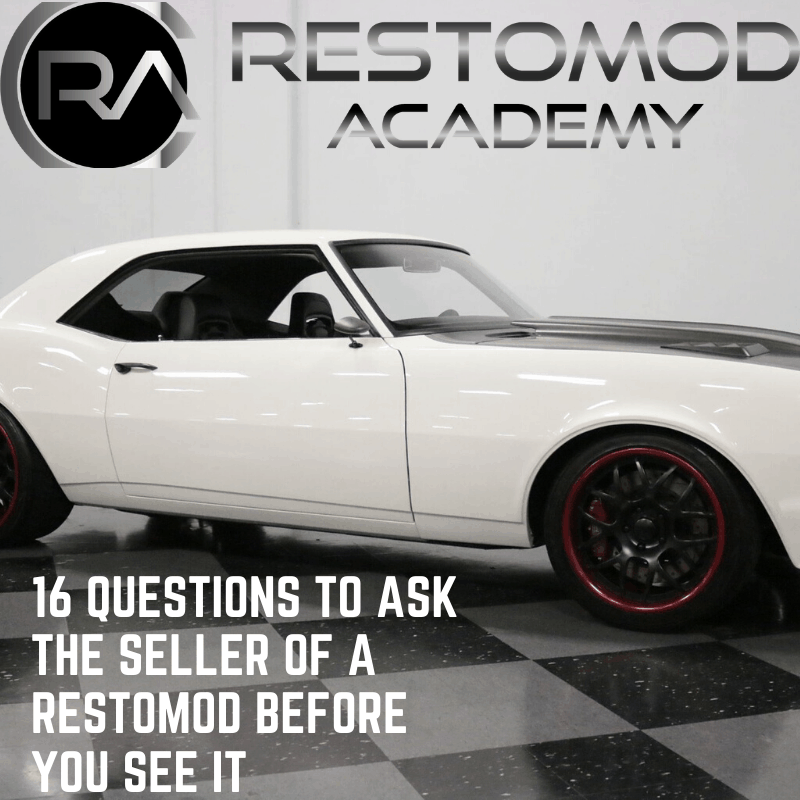You located the Restomod of your dreams for sale online but it’s important to ask a seller of a restomod these top 16 questions before you see it. So, before you go take a test drive, or worse, get in a plane and fly across the country, perform due diligence.
Start with an in-depth phone call with the seller to determine if it is worth your time for an in-person visit. Plan for 45 minutes; take your time and be thorough. Nearly all restomod owners are proud of their vehicle and enjoy the conversation. In the process, they give you an education along the way. Sure, this may sound like a lot of time. But spending 45 minutes on what is likely a six-figure purchase hardly seems like a waste of time.
Not to mention, there are costs involved with flying out to look at a vehicle only to find out the car didn’t have a clear title. Or some other major situation that would have been discovered in a brief phone call.
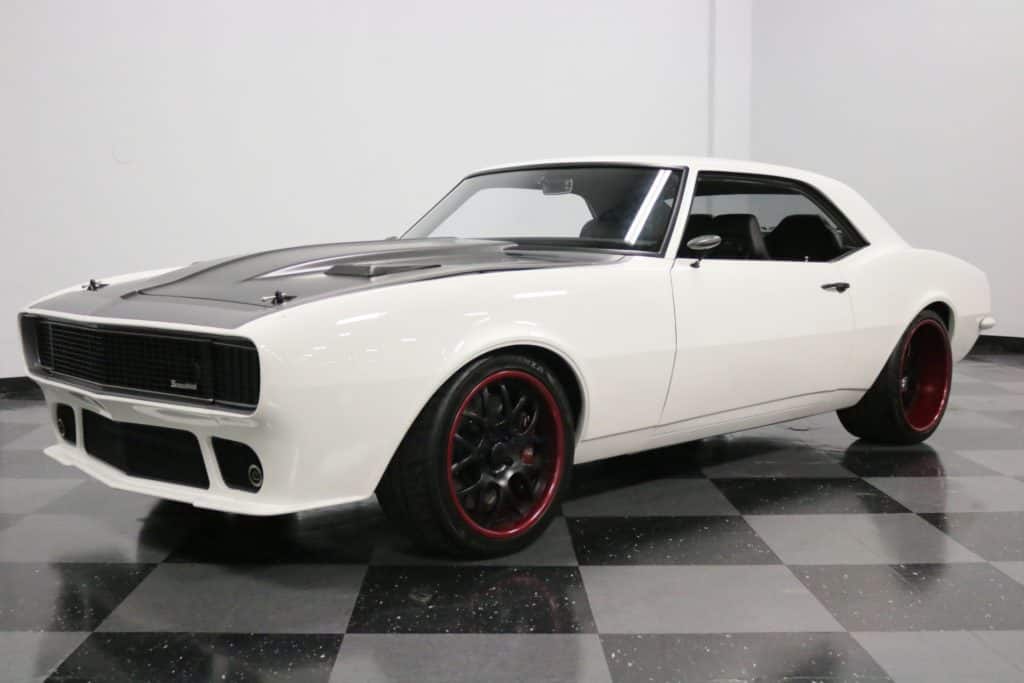
Time is of the Essence
If time is of the essence, you can certainly send these items over through email. However, resist the urge to take the answers at face value in a return email. Not to mention, most sellers do not want to respond with a multiple page email in response to a cold email from a buyer who may not be serious or looking for a deal.
When thinking about the questions to ask a seller before seeing the restomod keep this in mind. A phone call makes the buyer experience more personal and you can gauge their authenticity and motivation to sell and they can evaluate your likelihood to purchase.
These following questions are organized from most important to least important, so you get to the heart of the matter in quick fashion. There are so many cars for sale that it is not worth making major sacrifices in terms of price and quality unless you are compensated by buying at a deep discount to market values AND you fully understand the work needed in the car.
If at any point you get a deal-breaker answer, thank the seller for his time and end the conversation. Keep in mind that these are questions for a typical collector, so some of these questions may not be relevant. Grab a pen and paper and get ready to dig into your investigation.
Question 1: Is it A Clean Title?
Cars with branded titles (i.e. salvage, junk, flood, etc.) are prone to lingering issues from their repairs and may never run as good as they did before the event that left them without a clean title. This answer should be simple and to the point.
For some reason, if the title isn’t clear there are ways to still purchase it. However, this should be a MAJOR negotiating item else the phone call is over.
If the seller starts with an explanation and does not give a clear, “Yes, it’s a clean title”, then this phone call is over.
Question 2: Is The Title In Their Name?
The last thing you want to do is invest hours of time in a car only to find out the guy you were dealing with cannot legally sell you the car. Be wary of people who are selling cars for “their cousin”, “a friend”, or someone else of close relation to the seller.
If they still insist that are acting as an agent for the seller, request a copy of the title and the seller’s driver’s license to be sent to you, or ask for the seller’s number and speak directly with him.
Question 3: Is The Car Currently Registered?
This is a sign that the car is being driven on a somewhat regular basis. Cars need to turn over several times a month just to stay active. If a car is not registered, you can pretty much count on it to have been sitting for an extended period.
Again, this in and of itself isn’t necessarily a deal-breaker. Rather, it should give you a moment of pause, and desire to get more clarification, and it’s a possible indication about the condition of the vehicle.
Question 4: How Many Miles Did You Drive The Car Last Year?
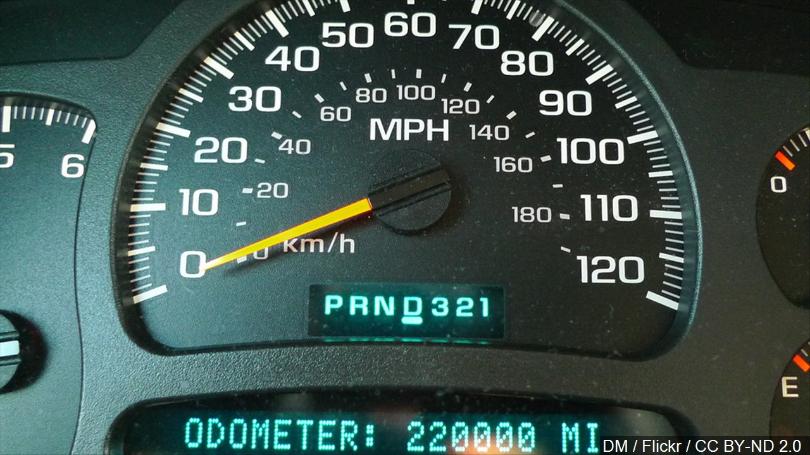
This is a secondary question to the registration question. More proof that the car has been driven. A car that puts on 500 miles a year is one that is probably going to be in at least driver, if not better, condition.
Keep in mind, if your’re buying a professional investment-grade restomod then that’s obviously why the vehicle hasn’t been driven.
Question 5: How Long Have You Owned The Car?
This is a great question to weed out car flippers and owners who bought a car that had more problems than they expected. How long is the right length to own? Generally, the longer the better. Of course, there are exceptions for a shorter holding period, such as life events (i.e. divorce, new baby, moving, job change), but usually, these do not happen with months after buying a restomod.
There are occasions when someone will buy a vehicle from an auction site (e.g. Barrett Jackson, etc…) and try to re-sell the vehicle. In fact, its quite common with higher-end restomods and there is nothing wrong with this as long as the seller is being upfront about it.
Moreover, there is nothing wrong with paying a finders fee to a seller who is doing exactly that. However, you truly need to investigate the situation as you don’t want to inherit someone else’s mistake.
Question 6: Why Are You Selling?
- “I’ve had it for ‘X’ years and I don’t drive it”
- “My kids have no interest in it”
- “I’m too old to deal with it anymore”
- “My wife told me either it goes or I go” are all reasonable decisions to sell a car.
Dumb things sellers say to try to unload their junk on you include:
- “It needs more work than I want to do to it.” This potentially means more work than YOU want to do to it too so this is a clue to run, not walk, away or stay in the game and negotiate the best possible price.
- “It just needs [one] part and I don’t have the time to fix it” (if it needed one part, the seller would have done it himself and asked more for the car). This should send a fight or flight response in which case, take the flight…
- “This car in mint condition would sell for ten times what I’m asking.” In this case, the guy just avoided the question entirely. Moreover, the question then comes to motivation, then why doesn’t he put the money into it and do exactly that? In addition, which vehicles is he referring to, does he have specifics? It’s ok, if not wise, to be skeptical so tactfully take that approach and let him “enlighten” you.
You can vet his answers and the discussion later with professionals as needed if you think it’s a worthwhile use of your time.
This question is not always about the answer, but the way the seller says it. If he blurts out some vague answer that does not sound convincing, there is probably a lot more lie than the truth. If you are dealing with a seller who goes into all the lifelong memories he made with the car, you are on the path to buying a car that was loved.
This is why having a conversation, not an interrogation, is so important. If a seller knows a qualified buyer is on the phone and the call is taking too long that is a bad sign.
Question 7: Is There Any Rust On The Car?
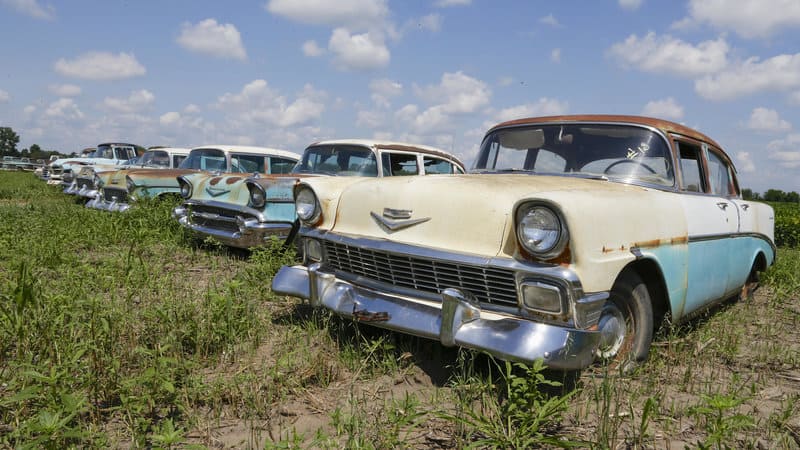
Rust is bad and usually a deal-breaker. An honest seller may say there is no rust in his car because he is only looking at the car as it is parked in the garage.
However, rust usually starts on the bottom of the car; this means the frame, wheel wells, exhaust, suspension, and floor. Unfortunately, this usually requires throwing the car on a lift to look underneath the car.
Rust is one of the most expensive things to deal with for someone wanting to restomod a vehicle. It takes a long time to media blast a vehicle, and repair, and replace the unsalvageable parts.
So, rust is a MAJOR problem and ignoring conducting solid due diligence of rust damage is one of the biggest mistakes a buyer can make.
Question 8: Can I Take This Car To A Local Inspector?

The seller should respond with an “Absolutely” immediately. This is one of those deal-breaker questions in the event the seller says “No.”
Question 9: What Three Things Would They Fix Immediately?
Essentially, you’re asking “What’s wrong with your car?” Most classic cars have issues. These can be big or small issues, but there will be problems. A seller will usually disclose what known things have been problematic with the car when asked because they figure an inspection will reveal these issues to the buyer.
One thing to keep in mind is that a seller may not have knowledge of a problem with the car. This is why any car you buy should undergo a thorough inspection by a knowledgeable mechanic.
Many detailed oriented sellers will keep extensive records of every bolt turned on their car. These are great sellers to deal with because they truly care about their cars. Do not be afraid to ask them to send over copies of the receipts and any mileage logs they may have in their car.
If the seller is a home mechanic, they should be able to provide receipts for parts purchased. Again, most sellers are proud of the care given to their car so this should not be a bad exchange.
Question 10: When Was The Restomod Performed And Who Did The Work?
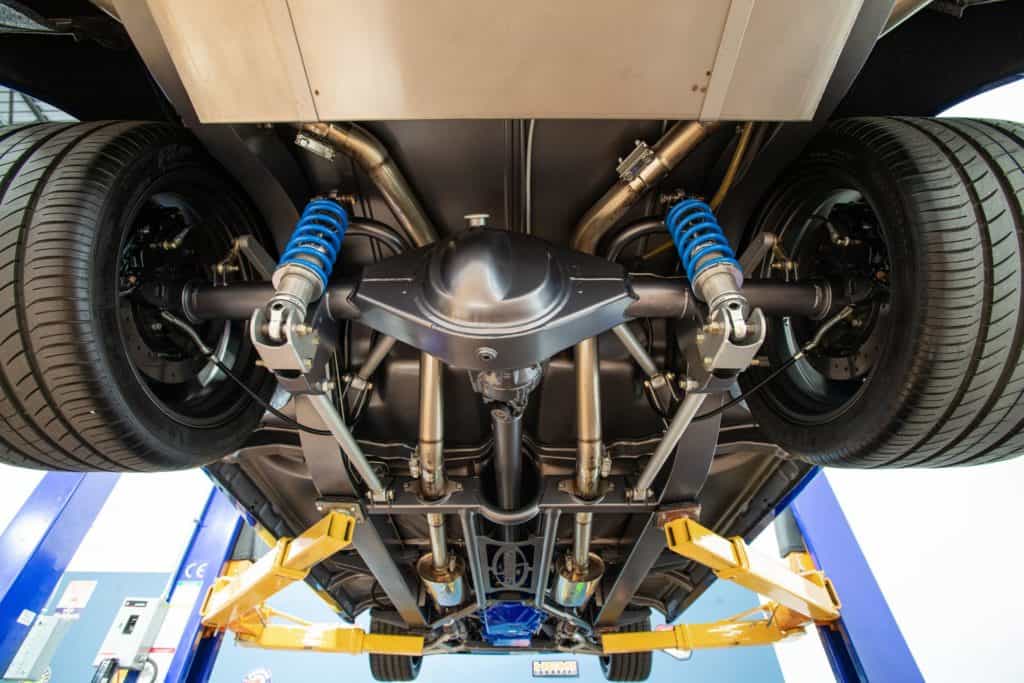
Some restomod car owners are doing it yourself (DIY) types. Ask questions about the seller’s experience with working in restomods. You can put a lot more faith in a seller who builds/repairs/maintains restomods as a serious hobby compared to the guy who considers an oil change a major repair.
In addition, find out how many miles have been put on the car since leaving the shop or the restomod was completed.
Do the following items work?
- Brakes
- Lights-headlight, turn signals, brake, and dashboard
- Window wipers
- Gauges-tach, speedometer, odometer, fuel, etc.
- Heater and/or AC
- Horn
These seem like easy fixes, but some of them can be quite expensive. If you have more than one, the cost starts to escalate quickly. Another reason for asking about these items is that it’s another way to find out if the car has been well cared for by the current owner.
Question 11: Would You Feel Comfortable Driving This Car On A Three-Day Road Trip?
Many classic cars start and do great around town, but venturing past city limits can be a daunting ordeal. Any seller of a restomod who pauses before answering might not be so confident in his car. Feel free to follow up with questions on how the car would perform on a road trip. Keep in mind, a restored car is NOT a restomod mod. The keyword is the “mod” which means modernization and this usually improves the car’s safety, performance, reliability, and therefore its drivability.
Question 12: Have You Owned A Lot Of Restomods
Are you dealing with a collector with an extensive collection, a long-time owner with one car, or a restomod flipper? That is what you are really asking here. Generally, you want to stay away from the flippers because the long-term interest of the car is not at the forefront of their mind.
The only real exception is that of a professional restomod builder or someone that takes truly restored vehicles and modernizes them for resale.
Question 13: Is The Car Numbers-Matching, Stock, Or Modified?
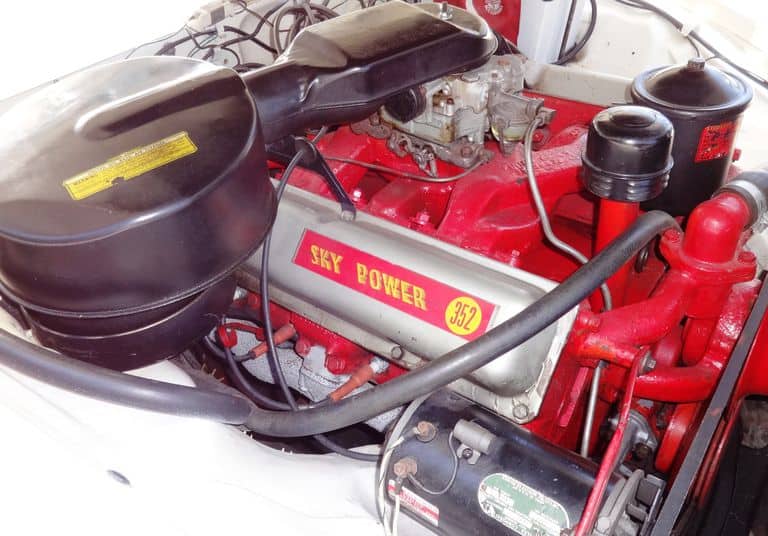
For some buyers, numbers-matching is extremely important. If it is to you, ask for pictures of the numbers off the car so you can verify that the car is numbers matching prior to trekking out to see the car in person. This includes numbers off the engine block, VIN, fender tag, frame, and transmission.
Different manufacturers used various ways to code their cars, so make sure you do your due diligence on what numbers need and do to match. If you are one of those guys that could care less about original build components, skip this question.
Keep in mind, on a restomod, there really shouldn’t be a ton of true numbers matching cars because that’s the whole point of a restomod is to modernize it which is almost the complete opposite of restoring a car.
Be skeptical of someone selling true numbers matching “restomod” or just know it may be a restomod in progress – which may be ok depending on your goals/expectations.
Question 14: Can you send over additional pictures or videos?
Additional pictures include any shots that you would like to see that were not in the original ad. Or, if the car you are looking at has known problem areas. Getting a picture of the inside trunk without carpet on is a great way to spot hidden rust. There is no substitute for seeing a car in person, watching the owner do a cold start on a video is a great way to get a “gut feel” opinion on how it drives.
TIP: To prove it is a cold start, have the owner put his hand on the engine prior to starting the car.
Question 15: Was The Car Ever In An Accident?
With Carfax today, you know that five-year-old Toyota was in an accident. But many classic cars have been around long before the internet took off. As a result, the seller may not know the answer to this question given the car’s history of owners, but it is worth asking. This is especially true of restomods as there is usually a reason someone decides to forgo the original parts.
Question 16: See If The Sell Has Anything Else To Share
Yes, the seller is probably exhausted by now. This open-ended question can yield great nuggets of information. Maybe he tells you how he needs to sell the car because he is moving next week, or that he needs money for his kid’s college fund. Let the seller talk and see what information you can pick up.
Food for Thought:
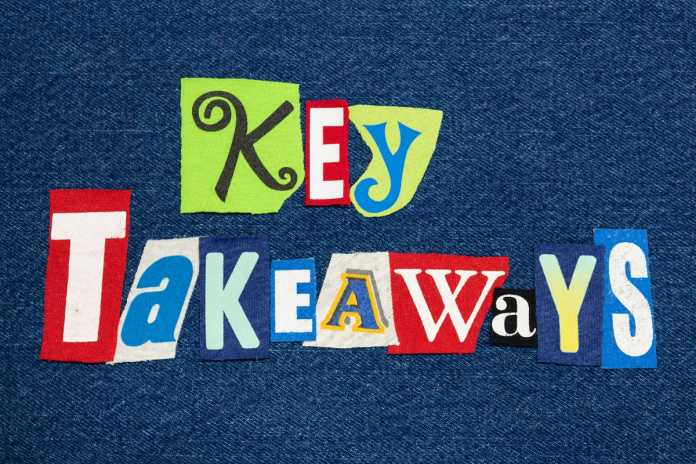
Dealers know less about the car for sale than private sellers do. This is because dealers are in the business of turning over inventory. Oftentimes, the car’s owner will leave detailed repair and ownership records with the dealer. However, you may not get the emotional story of the car’s history from a dealer.
Ask for any supporting documents such as repair work is done, copy of the title, or previous bill of sale. Some day you will sell this car and the buyer might be ready to grill you with questions. So have your documentation in order.
Things To Consider
Be careful talking about the price on the phone and be genuine. The seller has just invested a significant amount of time and you have not seen it in person. Before you start talking price, go out and see it. You know what he is asking because it is listed in the ad. So, no need to start negotiating before seeing the car in person. The only exception would be if you’re traveling across the country or something like that. However, purchasing a used restomod can be a risky proposition.
Don’t only try to get the best deal as saving money is not usually a guaranteed win in the long haul. Rather, finding a car that has been properly cared for is ideal. When you know almost everything about the car’s history it may be worth more than shaving $2,500 off a purchase price. Everyone wants a deal but the owner of a truly sorted out restomod isn’t likely all that desperate.
Thank the seller for their time. Both of you have invested a significant amount of time in this process. You are developing a level of trust now and you are no longer a black-and-white email. Rather, you are a person that the seller connects to and wants to work with selling his classic car.
Final Thoughts:
These questions to Ask a Seller of a Restomod Before You See It Interviewing are important. A car seller is a time-consuming process and many buyers do not want to put the time in because they want that car in their garage now.
After a couple of these phone interviews, you will be much more comfortable with the process. Even though this seems like a lot of work for something that may or may not pan out, just think about how much time, and money, you will be spending on a car that turns out to be a basket case because you did not do your due diligence.
Moreover, instant gratification on a purchase of this magnitude is downright foolish.
Related Questions:
Making money on classic cars can be very difficult. Buying something simply because you think it’s a good investment can be risky. The collectible car market is very volatile. Experienced dealers will tell you that a collectible car is only worth as much as someone will pay for it.
Look for large bubbles in the paint or rust-created holes in the lower door, the lower fenders just behind the wheel, in the front fenders, and in front of the wheel at the rear fenders. If you see through a steel panel, replace it.

